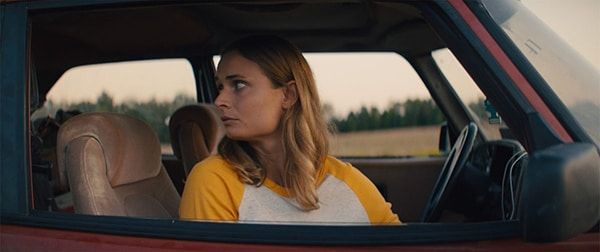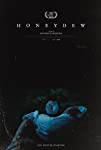Eye For Film >> Movies >> Honeydew (2020) Film Review
Honeydew
Reviewed by: Jennie Kermode

It's a controversial theory, but many scholars have argued that ergotism - poisoning caused by a fungus which grows on rye - was behind numerous cases of supposed witchcraft in centuries past, including the infamous Salem witch trials. Alongside other symptoms, it can cause convulsions, hallucinations, mania and delirium. There is no ergot in Devereux Milburn's film but a similar, fictional fungus - sordico - is said to have been found in the region where the story takes place, with heroine Rylie (Malin Barr) dispatched to study it.
Travelling with Rylie is her partner Sam (Sawyer Spielberg, Steven Spielberg's son), an actor who is trying to get to grips with a script. Each in a separate world due to their focus on work, they lose their way on a trip through the country and can find nobody helpful to provide them with directions. When night falls and they're politely but firmly told that they can't camp on any of the nearby land, they seek help at a farmhouse , looking for a phone they can use to call their car insurance company and fix a damaged engine. It's there that they meet Karen (Barbara Kingsley), a sweet, frail elderly lady who welcomes them with lots of reassurance and a vast quantity of food.
If Karen is a bit clingy, it seems probable that that's because she lives alone with her disabled son and doesn't get much company. Rylie is immediately sympathetic to her and, as the hour grows late with no sign of the promised help, she's happy to accept the offer of a comfy bed in the basement. Sam is just happy that this means he can sneak upstairs in the night and (with Karen's permission) gorge on just the kind of home cooked goodies that are forbidden by the strict diet Rylie holds him to. Even she has secretly helped herself to a cupcake, breaking with her vegan diet. There is the usual naivety about veganism here, and no messy gut problems ensue, but given what does happen, that is but a small mercy.
There's a great deal of potential in this setting. It's Milburn's first feature and he seems keen to show off everything he learned in film school, spoiling us with dreamlike landscapes, detailed interiors and whimsical melodies like so many more sticky treats, then doing it all over again through different lenses, easing in and out of focus as the effects of something Rylie and Sam have eaten takes hold. What follows is a descent into madness, a species of all-American folk horror bound up with Biblical fundamentalism and the tainted bounty of the land.
Telling a story in which some characters routinely make irrational decisions is fraught with challenges. Milburn has understood that it's better to focus on mood and sensation than on any kind of tidy narrative, and that works in his favour, but the film is still far too slow in its middle stretches without achieving anything extra as a result. That's the problem with bringing in so many ideas: a successful harvest requires winnowing. There are some fascinating themes here reflecting on what the US has allowed itself to become, even in its heartlands, but ultimately the film works better as metaphor than as a tale in its own right. It narrative loops around like the passage of the seasons but doesn't deliver as much sustenance as its delicious appearance suggests.
Reviewed on: 25 Oct 2020
















